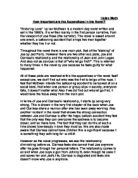Vicky Charles
What is the effect of the two appendices on your appreciation and understanding of the novel?
The two appendices in the novel act as a way for McEwan to draw the novel to a close and tie up loose ends. He uses them to reveal details about Parry’s background and his condition, and leave Joe and Clarissa’s story with a happier ending than we are left with at the novel’s close. The first Appendix offers an alternative, unbiased view of the situation; it is unemotional and factual, in contrast to Joe’s personal narrative. The second Appendix, however, serves as evidence that the ending to Joe and Clarissa’s story will only remain happy so long as Parry is locked up – after nearly three years in a mental institution, he is still very much in love and obsessed with Joe.
Appendix 1 acts as closure for the story. It lets the reader know what happened to Joe and Clarissa – and to Parry. This is not something that could be written into the end of the novel very successfully by using the same format as the rest of the book. Instead McEwan has included a bogus paper from a journal that actually does not exist. The formal style is a great contrast to the personal narrative of the rest of the book. McEwan has used this style in order to suggest objectivity and authority. The bibliography reinforces this authority and encourages the reader to believe what they read. Writing in the third person enables McEwan to disregard issues such as whether Joe would have known certain facts. For example, we find out just how Parry managed to organise the restaurant shooting, something that Joe would not have known. We are given background information on Parry, and his illness is explained; McEwan tells us that the balloon incident created an emotional trigger that pushed him into madness. We learn more about Parry’s childhood isolation, which may have made him prone to such an illness. It also explains some of Parry’s protesting to Joe throughout the book: “It was you. You started this, you made this happen…” We are told that de Clérambault’s patients are convinced that the person they love began the affair and cannot be persuaded that their feelings actually come from mental illness. This explains Parry’s anger towards Joe: he honestly believes that Joe has set everything up.







